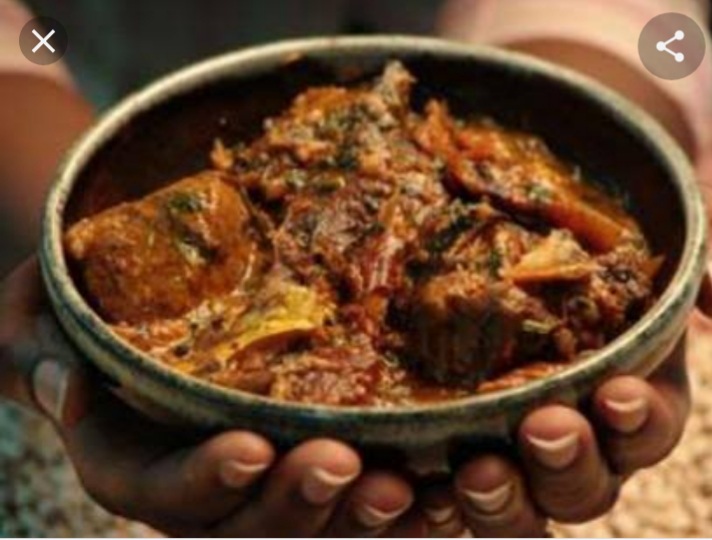

It is a taboo for Asaba natives to eat Ogbono soup
It is believed that their mother goddess, Onishe uses it for spiritual purification which in local parlance is known as ife-ahu.”
At the mouth of the River Niger is the sacred abode of the deity, Onishe, the spiritual mother who holds the destiny of Asaba people.
Apart from the serenity that pervades the entire enclave, there are big ogbono trees lining up both sides to the groove of the mother goddess.
The mystery behind these trees is the belief that for the past 250 years, neither the leaves nor the ogbono seeds have ever fallen on the ground.
This is indicative of the spiritual value of ogbono to Onishe, as she uses it for her spiritual functions.
Report says Onishe is as old as the city itself.
Everyday, every hour and every moment, Onishe faithful besiege her vicinity to seek spiritual help and protection.
But nobody goes to Onishe shrine with empty hands.
“If you must solicit Onishe’s assistance in whatever way, you visit her with either a full grown cock, a goat or even a cow depending on the financial capacity of the individual”, reveals Ogbueshi Nwosa Onwuegbuezie, the head custodian of Onishe.
For Asaba people, it is hard to seek Onishe’s help without corresponding result.
Though, for those adherents of the deity who are financially incapacitated, they are at liberty to pledge that upon the realisation of their desires, they will appease Onishe with whatever they can afford thereafter.
According to one of the custodians of the deity, Ogbueshi Nwosa, Onishe appears to her subjects in different forms.
Sometimes she could appear as a crocodile, particularly during festive periods, to accept whatever sacrifice that is being offered her.
At other times, she could appear as the mother she is, dressed in immaculate white wrapper and with her big long breasts exposed.
However, it is believed that those who see Onishe as mere absence of reality suffer consequences when they act in any way contradictory to what she stands for.
In addition, whoever wants to worship Onishe must abstain from sexual intercourse, at least a few days before the day of worship.
The worshipper is expected to dress in all-white attire, including underwears. Moreover, a woman in her period is not expected to visit the shrine.
Onishe is only worshipped on Eke day (day market). Whoever fails to keep to the rules of Onishe cannot go close to the shrine.
At the shrine of Onishe, it is a taboo to drink palm wine, hot drinks, beer or any other liquor.
The official and acceptable drink of Onishe are ogolo (a special brand of local brew) and Fanta.
Before Asaba people eat the new yam, they must first visit the Onishe shrine with the Asagba of Asaba, the traditional ruler.
The people must first appease Onishe with a cow slaughtered at the shrine, and enough food would be cooked for everyone present.
It is the tradition of the people of Asaba to pay homage to Onishe and solicit her help in the year ahead for a bountiful harvest as well as protection against any evil.
For ages, Asaba people have pledged their loyalty to Onishe, the deity that has been their mother both in times of war and peace.
The deity protects the people spiritually and physically from both external and internal aggressions.
Also, the deity alerts the people on any imminent danger threatening their existence.
Culled / Titilayo Kupoliyi